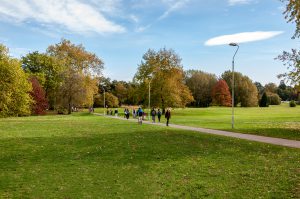The Energy and Environmental Management System (EEMS)
Scope:
The integrated Energy and Environmental Management System covers all activities and services under the operational control of the University at the Whiteknights, London Road and Greenlands Campus*.
Certification:
The EEMS has been certified to the internationally recognised standards ISO 14001:2015 and ISO 50001:2018 - the certificates can be found on our policies and strategies webpage.
Further information about the ISO standards/processes can be found on the ISO website here:
Aims:
The EEMS aims to reduce the environmental and energy impacts of the University's activities by using a structured framework based on continual improvement and embedding sustainability into key business processes.
The intended outcomes of the EEMS are:
1) To protect the environment by preventing or mitigating adverse environmental impacts;
2) To enhance the University’s environmental and energy performance;
3) To maintain compliance with environmental and energy legislation and other non-legal obligations
What are we doing to meet the ISO criteria?
- Understanding the context in which the University currently operates; it's internal and external influencing factors, risks and opportunity and interested parties.
- Identifying our significant environmental aspects and what we need to do to reduce the negative impacts and promote the positive.
- Monitoring and measuring significant aspects - including energy consumption via an estate wide energy review and a bench-marking exercise for waste.
- Setting objectives and developing plans to meet these objectives
- Communicating to our internal and external community about what we do and what we could do better.
- Training our staff to manage their activities in the most environmentally responsible ways possible.
- Reviewing and auditing in order to correct and continually improve our processes.
Significant Environmental Aspects
- Procurement - Responsible Procurement
- Estates development - Estates Department
- Use of energy and carbon management (oil, fuel, electricity, gas and renewable sources) - Sustainability Services - Energy, Carbon and Water
- Use of water - Sustainability Services - Energy and Water
- Use, storage and movement of hazardous substances - Sustainability Services - Hazardous Waste
- Use of refrigerants - Maintenance
- Waste production - Sustainability Services - Waste & Recycling
- Emissions to air - Emissions and Discharges 2022 - 2023
- Effluent and waste water - Emissions and Discharges 2022 - 2023
- Noise, light and heat emissions - UoR H&SS
- Conservation and biodiversity - Sustainability Services - Biodiversity & Green Infrastructure
- Education for Sustainable Development - Sustainability Services - ESD
How does it work?
Everyone at the University, including people working on behalf of the University, have an important role to play. This may mean switching equipment off when you have finished, using the right recycling bin, responsible and ethical procurement, purchasing energy efficient equipment or operating in an manner that protects the environment and saves energy. If you are unsure of your role, then email Sustainability Services.
Further documentation to support the EEMS can be found on the staff pages of the Sustainability Services Website.
To find out more about the University's sustainability initiatives and more about how you can do your bit you can enrol on the Online Sustainability Course.
We encourage all staff, students and anyone working on behalf of the University to make suggestions on how we can improve energy and environmental management at the University. To get involved or make suggestions please email sustainability@reading.ac.uk.
*The EEMS excludes wholly tenanted buildings such as RSSL, NHS’ Erlegh House (formerly STC), Knight, Harborne and Reading Enterprise Centre, all located on Whiteknights campus. It also excludes all Halls of Residence as these are managed by a third party that operates its own ISO14001-certified EMS. The EEMS also excludes off-campus locations such as the University’s farms, Thames Valley Science Park and overseas campuses.

